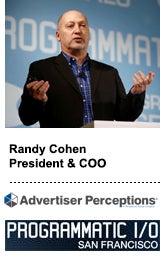 More than a quarter of programmatic decisions are made by agencies for their advertisers – up from 20% since September.
More than a quarter of programmatic decisions are made by agencies for their advertisers – up from 20% since September.
The revelation was presented by Mark Mahaney, managing director at RBC Capital Markets, at AdExchanger’s PROGRAMMATIC I.O conference in San Francisco on Thursday. The figures, which surprised Mahaney, show agencies make 27% of those decisions for their clients.
Yet there are still points of friction between agencies and marketers.
“The biggest issue is that, in general, the agency needs are not aligned with what the advertiser wants,” said Randy Cohen, president and COO of Advertiser Perceptions, who presented before a panel about advertisers’ insights on ad tech at PROGRAMMATIC I.O a day earlier. “There’s a disconnect around the different tech.”
Issues regarding transparency and arbitrage have eroded the trust between advertisers and their agencies. And with definitions of ad tech “murky at best, nonunderstandable at worst,” Cohen said, “advertisers are hearing ‘blah, blah, blah’” from their agencies when it comes to ad tech recommendations.
Unfortunately for those agencies, the marketing tech investments are controlled by marketers, said Randy Wootton, CEO of Rocket Fuel. If agencies aren’t trusted or if their tech recommendations don’t make sense, this could open the door for consultancies, like PwC and Deloitte Digital, to snap up business that traditionally went to agencies.
“Who will [marketers] trust to make those tech recommendations – an agency they’ve turned to for strategy and creative, or ad SI consultancy who can teach them [about technology]?” Wootton said.
Agencies argue they are making strides in shifting their traditional models to service clients’ needs around ad tech – which was why Publicis Groupe claimed it decentralized its VivaKi trading desk.
“The concept of the centralized trading desk had become outdated, and it didn’t really provide the level of service for clients we wanted it to,” said Justin Moreno, VP of solutions consulting at Publicis Media. “We had to bring the subject matter expertise of people who have their hands on the levers closer to the strategy team.”
Agencies are on the right path toward evolving their models to suit their clients, said Jonathan Hsia, managing partner and head of digital investment at Mindshare NA.
“There’s a perception that we push everything toward our trading desks and that’s not necessarily true,” he said. “CMOs will wake up one day and say, ‘I’m buying 40% of my media from tech vendors – why? We should be buying tech from vendors and media from agencies.’”
Tech giants like Google, Facebook and Yahoo often interface with clients directly when it comes to their tech. Yannis Dosios, VP of platform and exchange at Yahoo, said his company trains marketers, agencies and trading desks on how to use its platforms. But the vendor’s objective is to make a sale – which isn’t always in the best interest of the marketer.
According to Cohen, while advertisers may not be sure where to get their programmatic guidance, they’re positive about what they need: less tech jargon, more tangible business outcomes.
“The real issue is [being unable to measure] the benefit derived from utilizing technology and the ability to deliver on business goals,” he said.
The company that can provide that to clients – whether it be an agency, a consultancy or a vendor – will likely be its trusted guide.













